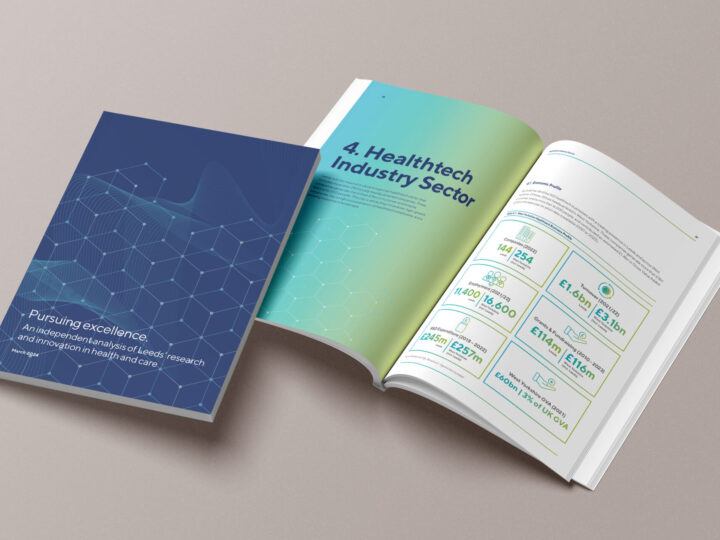Leeds’ strengths as a leading UK city and global player for health research and innovation are confirmed in an independent research report published yesterday.
The Perspective Economics research uses new data insights to compare Leeds with similar UK and international cities and ranks it consistently as a top location in this field.
Its analysis shows that, compared to other similar UK cities*, Leeds:
- has one of the highest concentrations of healthtech employees – equivalent to almost two in every 100 working age people
- has the most high growth healthtech companies securing equity investment
- has the most health and care-related patents applied for or granted
- is a top city for health and care research funding, securing over £200m in the past five years
- has the highest demand for research and innovation skills, having grown 50 per cent in the last five years
-
has the highest proportion of undergraduate students in bioscience courses, as part of its homegrown talent pipeline.
It finds that Leeds is home to 144 healthtech companies with a combined £1.6bn annual turnover, employing 11,400 people, and confirms the city’s renowned strengths in medtech, digital health, software development, data analytics and AI. It also shows that almost one third of all case studies submitted by Leeds-based universities to the UK’s Research Excellence Framework are health-related.
Tom Riordan, Chief Executive, Leeds City Council, said: “This report, along with news of West Yorkshire being chosen as the country’s third Investment Zone, continues to reaffirm and provide a real boost to our ambitions to deliver innovation that creates a healthier, greener and inclusive future for Leeds and across the globe.
“Leeds, a major hub for the NHS, continues to shine a spotlight and build on its international reputation for health research and innovation, with work accelerating around our £1.5 billion Innovation Arc, co locating entrepreneurs, businesses and clinicians to deliver world class innovation through collaboration.”
The report was commissioned by Engage Comms client Leeds Academic Health Partnership, one of the biggest partnerships of its kind in the UK and the only one in the Yorkshire and Humber region.
Professor Phil Wood, Chief Executive Officer, Leeds Teaching Hospitals NHS Trust, and Chair-elect of Leeds Academic Health Partnership said: “We welcome this new evidence which confirms some of what we already know – such as Leeds being at the forefront of developments in digital pathology, diagnostics, and artificial intelligence to transform care. And while it highlights our sector’s strengths, it also points to opportunities where we can further raise the bar.
“As a partnership, we are working hard to combine our respective strengths more closely to help solve some of today’s hardest health challenges, for our city and beyond. Our new state-of-the-art hospitals at Leeds General Infirmary, and new Innovation Village within the City’s Innovation Arc, are at the heart of some of this work and have been boosted recently with the Government’s announcement that our region is to be a £160 million Investment Zone for health and life sciences. So, we are not only celebrating our existing achievements through this report, but recognising the incredibly strong foundations on which we can further build our position as a global leader.”
Professor Nick Plant, Deputy Vice-Chancellor: Research and Innovation, University of Leeds, said: “These findings emphasise our city’s leading position for accelerating the development and adoption of new health technologies and clearly show Leeds’ outstanding track record in securing funding for interdisciplinary and collaborative health and care research and delivering impactful outcomes from this. The report also highlights the city’s fantastic pipeline of skills and talent, and the opportunities to support a more sustainable health and care workforce.
“Working in collaboration with our partners, addressing health and economic inequalities is at the forefront of our research. To achieve our ambition to improve health outcomes and quality of life for individuals and societies, our focus remains on the needs of our local community, especially those facing the greatest inequalities. As we embrace those challenges together, we are strengthening our standing as an international exemplar for health innovation.”
The report also identifies high potential opportunities for growing Leeds’ national and international influence and impact in health innovation. These include
- further strengthening support for businesses to scale-up and involving industry in designing that support
- extending opportunities for research beyond organisational boundaries and into clinical and community settings, and
- increasing the ambition and scale of research funding applications more strongly aligned to city needs.
Read and download the full report here. https://healthinnovationleeds.com/pursuing-excellence/
Case study examples
- Leeds-based PinPoint Data Science has brought together clinical expertise in cancer diagnostics with machine learning capability to produce an AI-driven blood test that could transform cancer diagnosis and treatment pathways. A surge in urgent cancer referrals is placing immense strain on NHS resources. Of the 2.8 million patients referred each year, 93 per cent will not actually have cancer. Yet every referral triggers a battery of expensive, time-consuming tests, while patients face agonising waits for diagnoses. The PinPoint Test analyses routine blood results using machine learning algorithms, and within seconds calculates a patient’s probability of having cancer. Since its incorporation in 2016, Pinpoint Data Science has secured £1.36m in private investment, more than £2.4m in grant funding and is continuing to grow its headcount.
- Leeds-based fertility treatment company Care Fertility is a world-renowned pioneering fertility group. In the 25 years since the company began it has helped thousands of people to become parents and, thanks to collaboration with local software development company BJSS and access to data science talent from the University of Leeds, the company is now using artificial intelligence to help its embryologists give would-be parents an even better chance of success.
Care Fertility’s application of AI is just one of a series of examples of where Leeds-based companies operating within spheres of local clinical excellence are developing genuinely world-leading AI technologies.
- Industry innovation support via Nexus and Health Innovation Yorkshire and Humber’s Propel programme: Based at the University of Leeds, Nexus empowers startups and scale-ups to develop ground-breaking solutions to real-world challenges. It provides an environment of cross-sector collaboration, knowledge exchange, and access to cutting-edge resources. Its proximity to nationally unique health research and innovation assets such as the Innovation Pop-Up at Leeds General Infirmary, and the NIHR Clinical Research Network – make it a particularly attractive place for health technology businesses. Nexus hosts Propel, Health Innovation Yorkshire and Humber’s digital health accelerator that is attracting international healthtech companies to establish operations in Leeds and the surrounding region. By hosting targeted bootcamps for healthtech startups from innovation hubs in the Nordics, the USA and Canada, Propel creates a pipeline of high-potential companies entering the local ecosystem.
The success of these collaborations hinges on the ability to connect clinicians, academics and entrepreneurs across the health and care research and innovation ecosystem, which, as numerous business interviewees affirmed, is one of the unique strengths of the ecosystem in Leeds.



